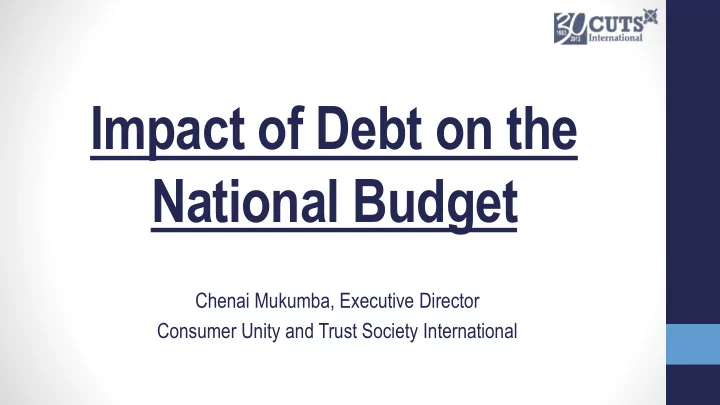

Impact of Debt on the National Budget Chenai Mukumba, Executive Director Consumer Unity and Trust Society International
Outline • Public opinion on debt • Introduction • Economic developments • 2018/2019/2020 resource envelope • Expenditure by functions of government • Recommendations
Low awareness on debt specifics, but high concerns As you may know, the Zambia government is spending Would you say you are very concerned about that national more money than it has. As a result, the country's debt debt, somewhat concerned, a little concerned, or not at all is four times more than it was in 2015, reaching about concerned about that national debt? 210 billion kwacha, and the government now spends one in every four kwacha to pay back the debt. How 100 ∆ October ‘18 much have you seen or heard about this national debt -- a great deal, some, just a little or nothing at all? -2 +3 80 A great deal/some Just a little/none 73 Don't know/Refused 60 6 40 40 20 24 0 54 Very/somewhat A little/not at all concerned concerned 3
Most say borrowing improves livelihood, except West Now I'm going to read you some pairs of statements, and for each one, I want you to tell me which choice comes closer to your point of view. Here is the first/next pair of statements. When Zambia borrows money, it means the When Zambia borrows money, the things they country can pay for projects like roads, schools, spend the money on do not make my life health centers and airports, which make my life better. better. 80 60 61 56 54 52 50 40 45 42 40 40 32 20 0 Total Lusaka Copperbelt East West 4
And majority say borrowing should be reduced The government We should begin We cannot reduce The government needs to reduce reducing borrowing borrowing now cannot reduce borrowing so less now so that it does because the borrowing now money can be spent not hurt the government needs to because there is still on repaying the debt economy, even if it keep spending, even a lot of infrastructure and more money can means less money if the debt is going to that needs to be built, be spent on drugs, is available for the hurt the economy. like schools, hospitals textbooks, and social government to and roads. cash transfers. spend. 80 75 60 65 40 30 20 21 0 5
Introduction • Debt was mentioned 20 times in the budget • “In addition, tight liquidity conditions mainly attributed to external debt servicing and as reflected in the accumulation of domestic arrears, have contributed to subdued economic growth” • “The depreciation was largely on account of increased demand for debt service, energy imports and the strengthening of the United States dollar.” • “Mr. Speaker, the 2020 Budget will focus on stimulating the domestic economy by reducing the budget deficit, rationalising debt contraction and dismantling of domestic arrears while protecting social sector allocations.”
Introduction • Historical challenges around fiscal fitness have not yet been adequately addressed despite an aggressive drive towards domestic resource mobilization and efforts towards improving tax compliance • The 2019 budget was K86.8 billion under the theme of “Delivering Fiscal Consolidation for Sustainable and Inclusive Growth” whereas the 2020 budget was K106 billion under the theme “Focusing National Priorities to Stimulate the Domestic Economy” • It is worth noting that for the past four years, Zambia’s Budgets have been focused on fiscal consolidation but the country’s approaches to fiscal management over the past few years did not deliver the desired fiscal outcomes there are concerns over whether this one will
Economic developments – Economic Growth 10.0 9.0 8.0 7.6 7.3 7.1 7.0 6.6 6.5 6.3 6.3 6.2 6.0 5.7 5.0 4.0 4.0 4.0 3.4 3.4 3.2 3.0 2.0 1.0 - 2006 2007 2008 2009 2010 2011 2012 2013 2014 2015 2016 2017 2018* 2019** Annual GDP Growth(%) - Vision 2030 Projection Annual GDP Growth (%) - Actual
Economic Developments – Zambia’s External Debt 10,000 9,370 8,790 9,000 8,000 6,947 6,704 7,000 6,000 4,730 5,000 4,000 3,548 3,180 3,000 1,980 1,668 2,000 1,521 1,199 1,000 - 2008 2009 2010 2011 2012 2013 2014 2015 2016 2017 2018
Expenditure by Functions of Government 2019 2020 General Public Services 36% 41,6% Economic Affairs 23,8% 20,6% Education 15,3% 12,4% Health 9,3% 8,8% Defence 5,8% 6,2% Public Order and Safety 3,3% 3,8% Housing and Community Amenities 2,6% 3,3% Social Protection 2,5% 2,4% Environmental Protection 1,0% 0,6% Recreation, Culture and Religion 0,3% 0,4%
Recommendations • To this end, the Government will: • i. Slowdown external debt contraction; • ii. Postpone or cancel some pipeline loans; • iii. Cease the issuance of guarantees; and • iv. Refinance existing loans • Tackle the rising debt: implement financial oversight reform • Demonstrating improved governance, management and controls over the economy and by enacting legislation needed to improve financial management in the country
Recommendations • Re-engage Cooperating partners especially in the social sector - Education, Health, Social Cash transfer, Water and sanitation to help with resources to implement an effective social safety net and lessen the impact of stabilisation measures on the most vulnerable • The Budget makes a strong commitment to continue ambitious infrastructure spending. However, there is need to consider ways of accelerating PPP engagement in public service delivery and infrastructure provision to ease on the fiscal burden of infrastructure development
Thank You
Recommend
More recommend